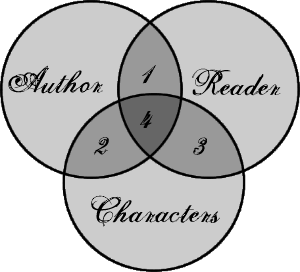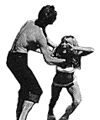The Realm of The New Fictions
Thursday, October 12, 2006 → by Danieru
I have a fascination with the borders of fiction and how we draw them. Here we find the relationships between author, reader and character builds the substance of each fictional world. How much does the author's knowledge reflect that of the reader's? How is tragedy, conflict and enlightenment reliant on knowledge the reader has which the characters do not? Is not the author the greatest of magicians, waving their wand of fiction, using slight of hand to distract the reader, to disguise their characters?
Think of the last book of fiction you read. Where did the power of knowledge lie within this venn diagram:
I submit to you that most fiction plays with relationships which fall inside 3 of the 4 crossover points:
So yes, 3 has been left intentionally blank, and for good reason. For here, in the merging of reader and character, we find knowledge which the author may never gain access to. Here lies interpretation, misrepresentation and imagination. Here fiction comes under the control of the perceiver, worlds form distinct from their manufacturer: here be the no-man's land of creativity.
Could it be that the future of fiction resides inside this region? Interactive fiction, such as that made real in video games and augmented realities, belongs in the hands of the perceiver. The reader, the interacted upon, becomes at once the maker, the magician and the resolution to the narrative. Here the character controls their author; here evolves the protagonist as omniscient God of their own world; here lies the future real.
How are we to best explore this Realm of The New Fictions?
Think of the last book of fiction you read. Where did the power of knowledge lie within this venn diagram:
I submit to you that most fiction plays with relationships which fall inside 3 of the 4 crossover points:
- The author and reader share narrative knowledge which the characters do not: Tension, tragedy and comedy may arise.
- The author forms the inner life of the characters, but this knowledge remains largely hidden from the reader: Creates mystery, disbelief and relies on slight of hand.
- The Unknown!
- Author, reader and characters have same knowledge: Tends to occur at the resolution of a traditional text. The illusion of this knowledge is another powerful tool the author may wield.
So yes, 3 has been left intentionally blank, and for good reason. For here, in the merging of reader and character, we find knowledge which the author may never gain access to. Here lies interpretation, misrepresentation and imagination. Here fiction comes under the control of the perceiver, worlds form distinct from their manufacturer: here be the no-man's land of creativity.
Could it be that the future of fiction resides inside this region? Interactive fiction, such as that made real in video games and augmented realities, belongs in the hands of the perceiver. The reader, the interacted upon, becomes at once the maker, the magician and the resolution to the narrative. Here the character controls their author; here evolves the protagonist as omniscient God of their own world; here lies the future real.
How are we to best explore this Realm of The New Fictions?
Discuss these ideas further in The Huge Entity Forum...
Categories: Fiction, Weird, Literature, Surreal, Ideas, Reality, Human, Simulacrum, Imagination, Consciousness
|
|

 Links
Links
 Subscribe via RSS!
Subscribe via RSS!


 Via Email
Via Email


Or consider James Morrow's 'The Last Witchfinder', purportedly written by Isaac Newton's "'Principia Mathematica'. Among other things, Ben Franklin is trapped on a desert island with an older woman; a turning point in his life.
Not to mention Orhan Pamuk's 'My Name is Red'. From Umberto Ecco on, the novel has been evolving toward metabooks. And away from reality. It is no wonder at all that author, book, and reader are increasingly miscible.
An all-out metaphorical tour-de-force is Thomas Disch's 'On Wings of Song'. I recommend it, as I do another of his books, 'Brave Little Toaster'. That one's directly out of Grimm.
October 12, 2006 8:47 PM
October 12, 2006 8:51 PM
I've been working on an idea for a novel/short-story which explores this metaphysical divide. How to write a protagonist whom the reader, and not the author, creates? Oxymoronic or just plain moronic?
I'll get back to you if I figure it out :-)
October 15, 2006 8:55 PM
October 21, 2006 5:47 PM
I came across it during my Philosophy degree, and am sure there is a name for it, but it escapes me. I am convinced that 'conventional' fiction, once it has embraced new digital technologies, will find itself emerging in that third section. I would love to be part of a new form of fiction which combined traditional text with an interactive medium through internet based communities. Imagine having a story which readers can alter the structure of as they read it, influencing what other people end up reading. A kind of 'Choose Your Own Adventure' for the community lead, digital age.
October 22, 2006 2:09 PM
Post a Comment